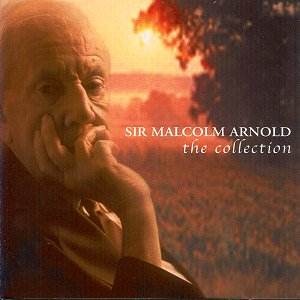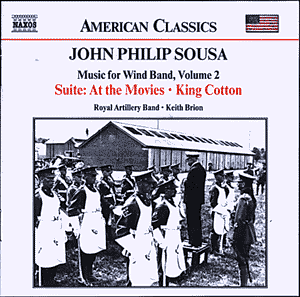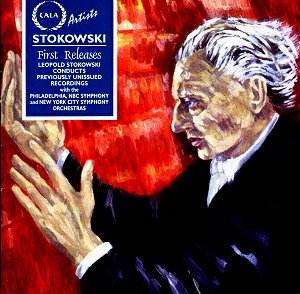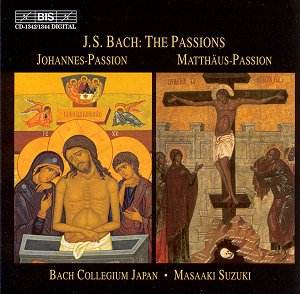 Composer: Sir Malcolm Arnold
Composer: Sir Malcolm Arnold
Works: A Grand, Grand Overture, Opus 57; Carnival of Animals, Opus 72; Concerto for 2 Pianos (3 Hands), Opus 104; Serenade, Opus 26; Larch Trees, Opus 3; English Dances, Opus 27 (arr for brass band); English Dances, Opus 33 (arr for brass band); Scottish Dances, Opus 59 (arr for brass band); Little Suite No. 1 for Brass Band, Opus 80; Cornish Dances, Opus 91 (arr for brass band); Little Suite No. 2 for Brass Band, Opus 93; The Padstow Lifeboat, Opus 94; Fantasy for Brass Band, Opus 114; Overture, Beckus the Dandipratt, Opus 5; Anniversary Overture, Opus 99; Guitar Concerto, Opus 67
Performers: Royal Philharmonic Orchestra/Vernon Handley; David Nettle & Richard Markham (pianos); London Musici/Mark Stephenson; Grimethorpe Colliery UK Coal Band/Elgar Howarth; Julian Bream (guitar)/Melos Ensemble
Recording: RCA 1959 (Guitar Concerto), RCA & Conifer 1992-97 (remainder) RCA-BMG 74321 88392-2 [2CDs: 75.36, 76.04]
Label: RCA
Sir Malcolm Arnold’s contributions to the British classical repertoire are often overshadowed by his more prominent contemporaries, yet this collection, celebrating his 80th birthday, serves as a compelling testament to his ingenuity and charm. The recordings encapsulate an array of Arnold’s works, showcasing his distinctive voice, which marries wit with a profound understanding of orchestral color. While the omission of his symphonies and chamber works might leave a gap in the narrative, the selections offered here present a vibrant introduction to Arnold’s rich stylistic palette.
The performances, led by notable conductors such as Vernon Handley and Elgar Howarth, exhibit a keen sensitivity to Arnold’s orchestration and rhythmic vitality. Handley’s interpretation of “A Grand, Grand Overture” is particularly noteworthy; the piece’s exuberance and clever orchestral interplay are executed with a buoyant spirit that captures the work’s celebratory essence. The Royal Philharmonic Orchestra, under Handley’s baton, navigates the complex textures with both precision and flair, revealing the nuanced dialogues between the brass and woodwinds, emblematic of Arnold’s orchestrational mastery.
The “Concerto for 2 Pianos (3 Hands)” stands out for its playful yet demanding nature. The slow movement, with its lyrical simplicity, is a testament to Arnold’s melodic gift, while the finale’s exuberance showcases his penchant for the outrageous. Pianists David Nettle and Richard Markham deliver a spirited performance, their interplay reminiscent of a well-rehearsed dialogue, effectively translating Arnold’s challenging passages into a joyful experience for the listener. The engineering of this recording enhances the clarity of the piano textures, allowing the listener to appreciate the intricate counterpoint and vibrant dialogues that characterize the work.
While the inclusion of multiple brass band arrangements of Arnold’s regional dances may seem excessive, the performances by the Grimethorpe Colliery UK Coal Band are nothing short of exhilarating. In “The Padstow Lifeboat,” for instance, the juxtaposition of the celebratory themes against the darker undertones reflects Arnold’s ability to infuse depth into seemingly light-hearted compositions. The band’s expertise shines through in their articulation and ensemble cohesion, although one might long for the broader orchestral colors present in the original orchestral versions of these dances.
The sound quality throughout the set is commendable, with RCA’s engineering affording an impressive clarity that captures the nuances of Arnold’s orchestration, particularly in the more intricate passages. Each work is treated with respect, ensuring that the listener experiences the full richness of the textures Arnold so skillfully crafted. The liner notes provide a concise yet informative overview of each piece, contextualizing Arnold’s works within his broader oeuvre and offering insights into their origins and performance history.
This collection is a celebration not merely of Arnold’s music but of the sheer joy he has brought to audiences and musicians alike over his long career. The performances are vibrant, the sound is crisp, and the selection offers a delightful cross-section of Arnold’s output. It is a fitting tribute to a composer whose work deserves to be better known and more frequently performed, ensuring that Sir Malcolm Arnold’s legacy continues to resonate with both performers and listeners for years to come.



